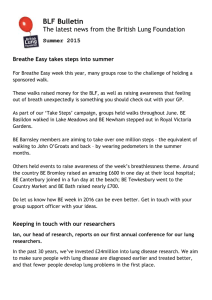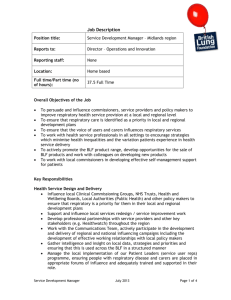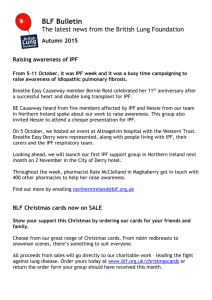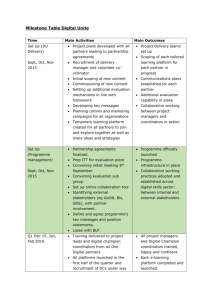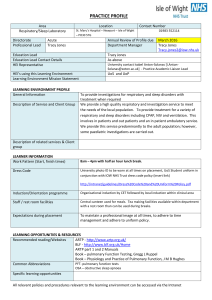British Lung Foundation Research Strategy
advertisement
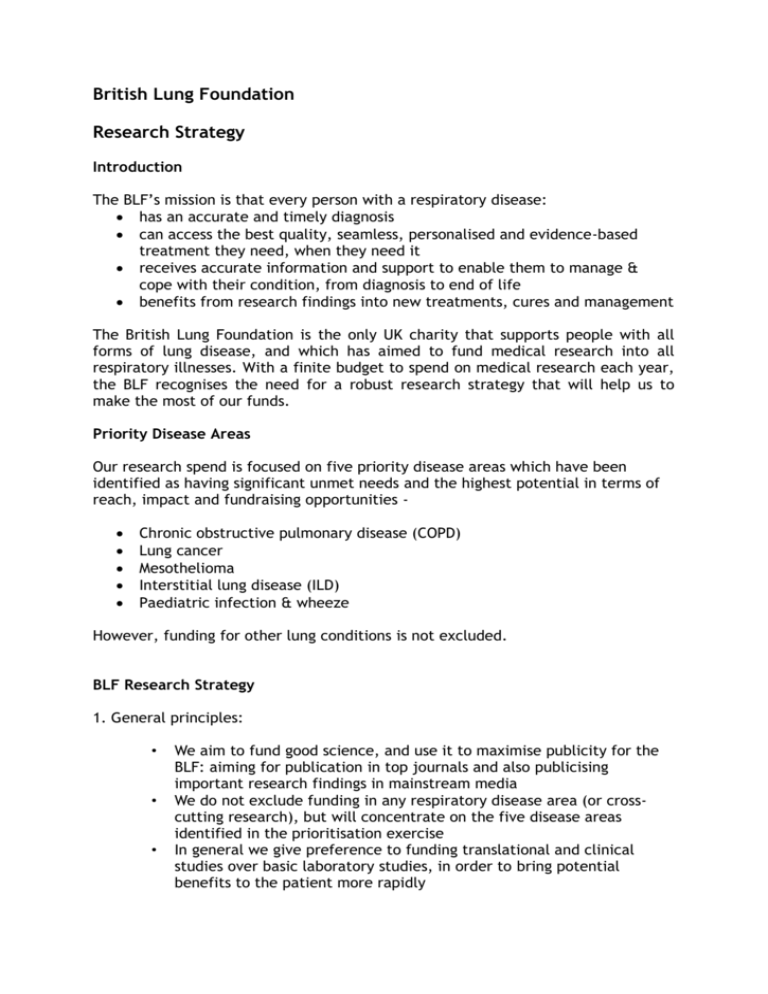
British Lung Foundation Research Strategy Introduction The BLF’s mission is that every person with a respiratory disease: has an accurate and timely diagnosis can access the best quality, seamless, personalised and evidence-based treatment they need, when they need it receives accurate information and support to enable them to manage & cope with their condition, from diagnosis to end of life benefits from research findings into new treatments, cures and management The British Lung Foundation is the only UK charity that supports people with all forms of lung disease, and which has aimed to fund medical research into all respiratory illnesses. With a finite budget to spend on medical research each year, the BLF recognises the need for a robust research strategy that will help us to make the most of our funds. Priority Disease Areas Our research spend is focused on five priority disease areas which have been identified as having significant unmet needs and the highest potential in terms of reach, impact and fundraising opportunities Chronic obstructive pulmonary disease (COPD) Lung cancer Mesothelioma Interstitial lung disease (ILD) Paediatric infection & wheeze However, funding for other lung conditions is not excluded. BLF Research Strategy 1. General principles: • • • We aim to fund good science, and use it to maximise publicity for the BLF: aiming for publication in top journals and also publicising important research findings in mainstream media We do not exclude funding in any respiratory disease area (or crosscutting research), but will concentrate on the five disease areas identified in the prioritisation exercise In general we give preference to funding translational and clinical studies over basic laboratory studies, in order to bring potential benefits to the patient more rapidly • • • We aim to maximise potential income to the BLF from grant-funded Intellectual Property We will consider collaborations, co-funding, and projects not necessarily located in UK, where they meet our objectives We will encourage and nurture early-career investigators 2. Key strands of the strategy; Capacity building Infrastructure funding Project funding Patient & public communication 2.1 Capacity building The need to build capacity for conducting medical research into lung conditions is essential in the battle against respiratory disease. Scientists often move from one field to another if funding is short and it is essential that we help early-career investigators to anticipate a long-term career in respiratory research so that they can make the future breakthroughs in the prevention, treatment and cure of lung conditions. We do this by: Offering travel grants, studentship and fellowship awards that will support lung scientists during the early part of their career and keep them in the respiratory field Contributing to workshops that aim to help scientists to convert their ideas into workable, successful grant applications - both to the BLF and to other funding bodies Offering constructive feedback to unsuccessful grant applicants that will help them to make successful applications in the future Additionally, we aim to ensure continued contact between the BLF and past and present grant-holders; we are doing this by establishing a ‘BLF Alumni’ organisation. 2.2 Infrastructure We have identified a lack of focused research in some of our priority areas, which could be addressed by establishing actual or virtual ‘centres of excellence’ in these diseases; costs to the BLF could be minimised by co-funding with major research funding bodies such as the Medical Research Council (MRC), the Wellcome Trust, and Cancer Research UK (CRUK). Depending on location, relevant University funding might be available also. Such co-funding would leverage our resources and permit ‘BLF’ badging or co-badging of the Centre. Such Centres would be able to develop focused, longer-term research programmes, with BLF input, and would also help nurture young research scientists and clinicians (see section 2.1). We will actively seek out and pursue such opportunities. 2.3 Project funding Historically the BLF has put out a call for full proposals for research grants in December each year, usually stipulating a preference for applications relevant to our priority areas or restricted research funds available for expenditure, and also an upper limit for the funds available for each grant. Under the revised strategy the process has been modified; the December call for applications will request a brief project synopsis only, from which the Scientific Committee will prepare a shortlist in February, detailed applications will be required from short-listed projects by the end of April, these will be assessed by external referees, and the Scientific Committee will rank projects for funding on scientific merit by the end of June. The BLF senior management team (SMT) will review the projects for strategic fit and make final recommendations for approval at the September Board meeting. Openly-advertised research grants will now normally be restricted to ‘pumppriming’ projects limited to a maximum of £10,000 (or exceptionally, £20,000), with preference for our priority areas. This is the type of funding which can permit an early-career investigator to develop a key new methodology or perform a pilot study, which will then put them in a good position to secure a larger grant from a major funding body in order to pursue a promising line of research. We are establishing advisory boards in our priority areas, composed of key clinical/scientific opinion leaders and patients/carers, who will meet periodically to propose key research projects which could provide early patient benefit, but which are not currently being pursued. These proposals will be discussed by the SMT and Scientific Committee, and if agreed to go forward will be advertised for tender by interested research groups. The tenders will be reviewed by external referees and the Scientific Committee and a recommended tender sent to SMT for agreement and budgeting, before being put to the Board for final approval. In the past, the BLF has offered several funding streams on a restricted basis, outside our more regular grant schemes. The Mick Knighton Mesothelioma Research Fund award, the June Hancock Fund Mesothelioma Research Fund award and the Henry Shelford Sarcoidosis Research Award are all successful examples of this. These grants offer a great opportunity for the BLF to support under-researched areas using funds sourced from outside our usual funding streams. This form of grant-giving will continue to be encouraged. The BLF has also offered jointly-funded awards in conjunction with funding bodies including the Medical Research Council (joint BLF-MRC studentship and fellowship awards). We are keen to explore every opportunity in developing our relationship with joint-funders and recognise the added value that this brings to BLF research expenditure. We are also happy to consider co-funded projects with other grantgiving bodies on an Ad Hoc basis. From time to time, work that could be considered to be research (e.g. questionnaires or audits on medical matters), or definitely is research (e.g. the ‘Respiratory Health of the Nation’ project) are commissioned or sponsored by BLF departments other than the Research Department. To ensure the scientific rigour of such studies, and that the BLF is compliant with any relevant legal and ethical regulations (see ‘Research Integrity’ section, below), a process is being put in place whereby projects which constitute research (or could fall into that category) will be identified by SMT at the ‘project brief’ stage and must be reviewed by the Research Department for their input and sign-off before the project can proceed. 2.4 Patient and Public communication Communicating about the scientific work we fund to a non-scientific audience is a vital part of our relationship with people who have a lung disease, their carers and loved ones. This communication is also a central tool for fundraising. With this in mind, application forms for BLF research grants request detailed nonscientific information about the work. The quality of this information contributes to our funding decisions. In addition, reporting systems for existing grantholders request detailed non-scientific information. Final grant payments are not made until a satisfactory final report has been received. By obtaining high quality lay information, we are able to report effectively on the work we fund to patients, carers, and the wider public. Our regular publication ‘Changing Lives’ reviews key achievements by our grantholders in lay terms and is a valuable communication tool for our stakeholders, and potential donors. We also encourage publication of relevant BLF in-house projects, policy statements and editorials in quality scientific journals and as abstracts at key conferences, to promote the image of the BLF as an organisation at the forefront of respiratory research in the UK. Supplementary statements to the Strategy: 1] Research integrity Regrettably, misconduct and even outright fraud occur in both laboratory and clinical research. It has been estimated that fraud is involved in ~1% of all research studies. Whilst all research fraud distorts the database on which decisions with medical consequences may be made, clinical research fraud may have more immediate safety implications. It is a legal requirement that the sponsor of a clinical trial is responsible for the integrity of the study and can show that adequate safeguards have been put in place to ensure this. The BLF has formulated a Policy on Fraud & Misconduct to ensure that we are satisfied that the parent institution of BLF grant-holders has adequate safeguards in place to meet their legal and ethical obligations in this respect, before the grant can be confirmed. 2] Animal Research Less than 25% of medical research funded by the BLF involves the use of animals. We will only fund animal-based work when there is no viable alternative to tackle the questions posed by the research study. The BLF’s Scientific Committee oversees a stringent procedure to ensure that animal work is only supported when absolutely necessary and that the animal work that we do fund conforms to strict regulations on the treatment of the animals involved. The BLF is a member of the Association of Medical Research Charities and adheres to the AMRC Statement on animal research. This can be found at www.amrc.org.uk. 2014
